#fundamental understanding of which choice it was. which is why he’s the one who survives and can start over
Text
Mike missing his shot to kill Hector and change the trajectory of his life and stay the man he wanted to be, because Ignacio got in the way and he wouldn’t shoot through him
Mike missing his shot to kill Walt and change the trajectory of his life from death to anything else, because Jessie got in the way and he wouldn’t shoot through him
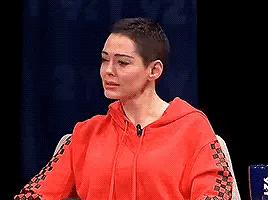
#better call Saul#breaking bad#mike erhmantraut#Mike missing his shot to save his son and ruining his own life and three others in one moment and then refusing to ever kill his son again#but because he never quite understood which chocie it was that killed his son still still for all his love and all his effort it’s never#quite enough. because it wasn’t the warning mike. it wasn’t what you said. it’s all the other things that made you the person who said it#you try so hard but you still can’t see the line. and because of that your tragedy repeats again and again#Jesse in s5 outside smoking while you all disintegrate a 12 year old in a barrel of acid because he’s the only one in the room with a#fundamental understanding of which choice it was. which is why he’s the one who survives and can start over#he knows what the mistake was
80 notes
·
View notes
Text
See I don't necessarily disagree with what seems to be the primary reading that Yue Qingyuan's shifu fucked him over, caring nothing for his needs or preferences and only for whether he was useful. That makes sense, it ties into plenty of the generational and societal themes of the story. It fits.
But iirc we don't actually get enough information to know that's what happened.
And the thing is it would be so in-character and also thematically appropriate if Yue Qingyuan absolutely did not explain his goals or why he was working so hard, because it was private and shameful and he didn't expect any sympathy, and there was a high risk of losing everything if he blabbed.
And also if he engaged with the existing ruleset with which he was presented, i.e. 'can't go off on your own on personal business until you've mastered your sword,' in the most negative and controlling manner possible, as absolute commandments.
He's a different kind of guy but he comes from the same background as Shen Jiu! It fucked him up also!
He is very very very not a guy who trusts the system to make allowances for him--even once he has all the power he 'does what he wants' and 'makes selfish choices' as a conscious transgression; not something he has a right to do, just something he can get away with so he's gonna. (And ofc he spends almost all the latitude he grants himself on sqq.)
And even less is he a guy who opens up easily.
He isn't too proud to ask for help or pity, so much as he just doesn't expect to get any.
So in this interpretation, he understood that rule as a non-negotiable barrier in his path, the target to overcome, and focused all his considerable will and talent on overcoming it through the sphere of action he felt he had control over.
And fucked himself up bad.
Whereupon his teacher, possessing absolutely no context for this dumb shit their star pupil pulled, did the only thing they thought might work to save his life, paying in the process no attention to the raving of someone deep in a psychotic break.
Like, I feel like there should have been a better, kinder medical option, but I don't know for sure that there was, so I can't say with certainty this was the kind of cruelty that derives from not caring enough.
And it really would be kind of elegant and so typical of Yue Qingyuan's fundamental tragedy if the real mistake was 'not confiding in anybody' the whole time.
And he was just so deeply sunk into the understanding that explaining and asking were useless that, even looking back, it never really occurred to him that maybe his mistake wasn't 'fucking it up when trying too hard to solve everything on his own' but 'assuming there was no help to be had, and that he had to do it all on his own.'
Like. What if this really could all have been avoided if he'd just trusted and communicated with the adult in charge of him? But of course, of course his history of trauma (neglect, child abuse, exploitation, being the One Responsible for the younger kids whom he could not keep safe) meant he was absolutely not going to do that.
It was basically impossible. For the person he was, the person the world had made of him. And that's always been the core tragedy the whole novel circles back upon.
People can only ever be themselves, and so very often the elements of self that let them survive until now are that which dooms them, that means they need someone else to intervene if they're ever going to be saved. Because your personal doom is always the thing from which you can't save yourself.
#hoc est meum#JUST LIKE SHEN JIU#yue qingyuan#svsss#scum villain#meta#trauma#ambiguous backstory elements#tragedy#growing into your deathmask#the fact that shen jiu got in#and got promoted#tends to imply the former generation wasn't particularly inflexible#or unwilling to entertain deviance#the fact that yqy got made Sect Leader#despite his disability#suggests his teacher valued him#on a personal level#though not necessarily a level that gave a shit#about his happiness or wellbeing#but we srsly do not know
226 notes
·
View notes
Text
some recent thoughts on Nie Mingjue and Jin Guangyao, and why even though I find Nie Mingjue very frustrating in the midst of his Baxia-induced anger issues, I think he’s also a pretty sympathetic character as a whole and it’s really understandable why he thinks the way he does
(as someone who ships 3zun and nieyao, and through the lens of “Jin Guangyao is my blorbo”)
I’ve seen a tendency to paint NMJ and JGY’s relationship in black and white in terms of who was fundamentally more in the right, which to be honest is not really the approach I take to fandom in general. to me the tragedy is that NMJ and JGY before JGY's casting-out had immense respect and perhaps even love (platonic, romantic, whatever) for each other. in the end, a lack of mutual understanding of each others' circumstances that could have otherwise eventually been overcome was driven, by bigotry, Jin Guangshan, and the Nie cultivation style, into becoming an insurmountable difference that eventually killed them both
NMJ definitely Did Not Get where JGY was coming from when JGY was making survival decisions and keeping secrets. he was simply not raised in a way where he ever even had to think about the types of choices that JGY has been forced to make since he was quite young. but at the same time, NMJ was a teenager raising his brother and his sect from a very young age and I think it's a disservice to his character to fail to acknowledge that his entire life he expected to die a young and horrific death, just like he watched his father die, and that this expectation deeply colors his approach to the world. JGY plays the long game. NMJ does not get to think about that, he just has to raise his brother, win a war, and try not to drive his sect into the ground before he kicks the bucket in a violent and gruesome manner. he does not have a choice about any of these things.
and said things are extremely difficult to do, especially as a teenager, which I think is a reflection of MDZS's whole thing where their entire generation is just traumatized by war and conflict and a dearth of genuine, honorable guidance and leadership, which leads to such fractures
but it's also a series of tasks that required the kind of attitude that Nie Mingjue develops, and that in combination with Baxia’s influence gives him this really immovable perspective on life that he just won't budge on with JGY. I think it’s really significant that when Jin Guangyao does regularly play Clarity for NMJ, they get along quite well. and I also think it's really understandable why NMJ is so stubborn and headstrong - he's had to fight his way through being sect leader and not take "no" for an answer, because what the hell else can a young, new leader do to avoid being taken advantage of? frankly even if he had taken up a bit of whatever guile Nie Huaisang didn’t hog from the Nie gene pool... why would he direct it towards self-preservation? he has no room for that kind of fear because he is going to be dead in a few years.
importantly as well, Nie Mingjue unjustly judges Jin Guangyao because he is unable to understand the context that JGY is coming from, but that same righteousness is the reason that he's the first person to have given Meng Yao a fair shake and rewarded his hard work and labor, and that matters a lot to Jin Guangyao and their relationship as a whole. you can’t really have one without the other unless you give Nie Mingjue time to grow up.
unfortunately, Nie Mingjue died his 20s, and was in his teens when the Sunshot Campaign began. look me in the eyes and explain to me what kind of behavior you expect from a 20-something with a magic rage sword.
#mdzs#the untamed#nie mingjue#nieyao#jin guangyao#that parting sentence is intended humorously not genuinely#please don't actually do that#also#/gesticulates wildly at luo binghe lmao#all-considered#I feel like if I have sympathy for binghe then I gotta have sympathy for nmj yfm?#I repeat for the love of god please don't come argue with me I started rotations again and I'm too tired#this is just because I like writing meta about my blorbos#mdzs meta#meta#my writing#im 27 atm and pretty sure that im older than nmj was when he died#which definitely colors my perspective
269 notes
·
View notes
Note
Whenever you can I'd really like to hear your thoughts about this and if you think it's accurate! ❤️ I absolutely adore your hxh meta and can't wait to hear more!!!

Hello! Thank you so much for the kind words, it means a lot to me! ❤️ These are fantastic observations and questions, as these traits are an important part of the basis of Gon's issues, and this tendency of his to rush into danger leads him into a lot of dark situations throughout the series. It's one of the most concerning aspects of his character.
His self-esteem issues are definitely at the root of this. Gon seems to have a fundamental belief that his life isn't worth much--hence why he tells Killua he's allowed to talk about dying, but Killua isn't. I think a big piece of this comes from the abandonment issues, as well as his issues with guilt (which I still need to write a post about). If even his own father won't stick around for him, what is he worth? And notice he frames Ging's choice in such a way where he doesn't assign blame to Ging--he believes that in a choice between him and being a Hunter, he must just be the inferior choice. Not a great basis for self-worth.
As much as he looks up to Kite, I don't think his encounter with Kite when he was younger helped--he was blamed directly for the mama foxbear's death and Kon becoming an orphan. And while I don't doubt at all that Mito loves him, I think Gon may see himself as a burden on her to a certain degree, and he tries to be as self-sufficient as possible as a result. (That's more of a headcanon of mine, but I do think the complex way their relationship is framed and Gon's behavior in the series supports this to a degree.)
Because he doesn't see his life as being worth much, he tries to take on everything alone, and he sees strength and power as a method to prove that he does have worth after all. If he can prove he's strong, maybe he isn't worthless after all! If he's strong, maybe he won't be a burden to others or unintentionally cause them harm (think about the mama foxbear, and ultimately Kite himself)! If he can become a Hunter and find Ging, maybe he can understand why Ging didn't stay with him, and he won't have to wonder why he left him behind any more!
I definitely think dangerous situations and escaping death give him a a sense that he is capable and worthy, plus it's a rush to him--a form of excitement and stimulation that he craves. Also, keep in mind that Gon grew up among nature, including many wild animals. While "survival of the fittest" is an oversimplification of how nature works, certainly at the same time, a weak animal is more likely to fall prey to a predator. So of course being strong is the more advantageous position to be in, and especially as a person who isn't sure of his worth or his place in the world.
I think he believes the stronger he becomes, the more dangerous situations he can escape, and the more strong enemies he can defeat, the more capable and worthy he'll feel. Because of how much his self-esteem then hinges on whether he's strong or not, things like Hisoka punching him and giving him his badge make Gon struggle to feel like he has value. The times we see Gon cry, like in his conversation with Kurapika in the airship about that moment with Hisoka, or in the scene after he couldn't win against Knuckle and couldn't go to NGL to rescue Kite, often relate directly to him not feeling strong enough.
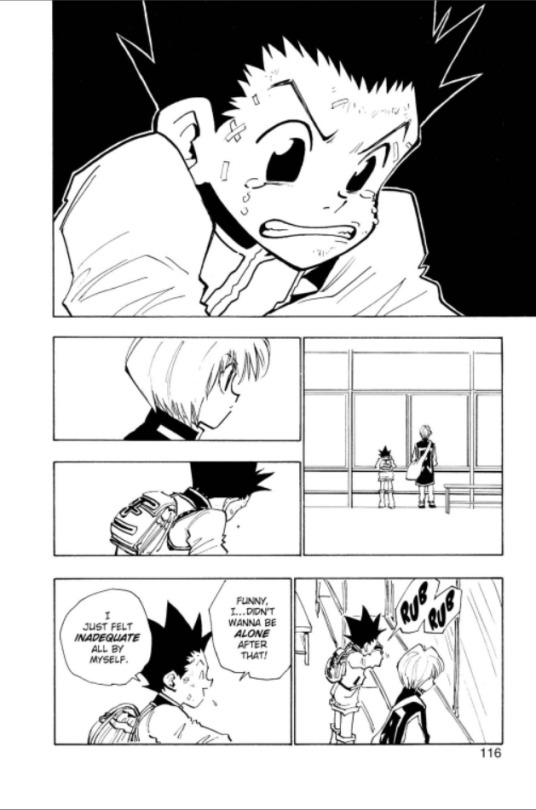
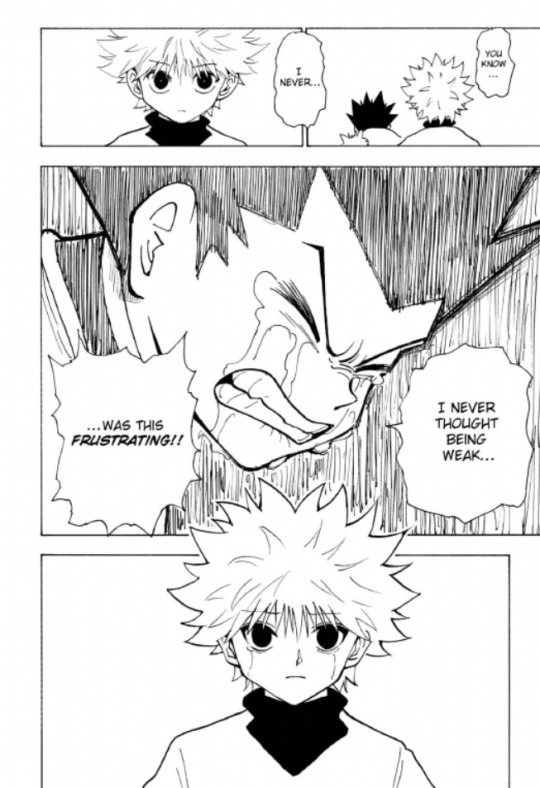
Also yet again (back to my usual refrain), this is in fact another subversion of shounen expectations. Shounen protagonists tend to be energetic and feisty teen boys who throw themselves into dangerous situations easily, and in most shounen series this is a trait that's not treated with much weight--they can handle it, nothing truly bad generally happens to them as a result, this trait of theirs is treated as something brave and admirable and "cool."
But with Gon, Togashi does give it weight--others worry about him and comment on this trait of his, his recklessness has real costs for him that escalate over time (think about the results of Gon tailing Hisoka in the Hunter Exam, Gon vs Gido, the end of Greed Island, and of course CAA), and ultimately his disregard for his own worth and safety essentially leads him to throw away his own life. In Gon, it's not an admirable trait, but a concerning and tragic one, with deep roots in his psyche.
It's brilliant to me how many of Gon's traits all link together--his low self-esteem comes from his abandonment issues and leads to his recklessness, he has a selfish streak because he's young and still somewhat immature and grew up isolated, and his short-sightedness as a result of that manifests in his sense of morality not being fully developed. And yet even with all of that, he's still a sweet, cheerful, kind, smart, and encouraging boy. I absolutely love the complexity of his character and how, if you carefully analyze him, the way he is makes so much sense.
Thank you for asking!
62 notes
·
View notes
Text
You wanna talk about Reiner, Jean and Marco?
Okay, let's talk about Reiner, Jean and Marco. Buckle up, there's a lot to talk about.
Disclaimer: this is not an anti post to any character or ship, quite the opposite. Read the whole thing before you jump to conclusions, thanks :)

Well, yes and no. First and foremost, the background. Jean and the rest of the cadets, while each had a goal, were training to defend what they thought to be all that was left of the human species. For 100 years, the walls protected them, but they were no longer secure. The military was humanity's last hope of survival. With these unimaginably high stakes always looming over them, the cadets ought to have developed a complex bond that would be very hard to put into words. Let's just say they were something more than just siblings in arms, and you could tell that. Throughout the series, you never get the impression that Jean and the others truly wanted to kill RBA. It also explains why Marco questioned Reiner and Bert about their conversation before he even realized he's made a mistake.
However, we also have to remember this scene. This happened not long after Marco's death. Realistically speaking, I don't see how Jean wouldn't have harboured a healthy amount of hatred in his heart. But it never overcame him because his grief over losing Marco was much stronger than his hatred for those who caused it.
He won't get his answers from Annie, but he could get them from Reiner after they captured him in Shiganshina. He convinced Hange to not execute him due to a mix of the aforementioned bond and his need to understand what truly happened to Marco and what were the shifters' true goals. And of course, because preserving one's life, even an enemy's, is in Jean's nature.
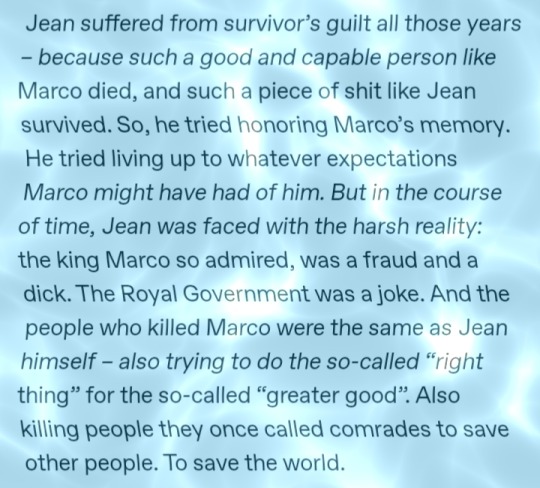
There's so much to unpack here, but first, let's focus on the idea that "the people who killed Marco were the same as Jean himself", which is a false equivalence supported by other false equivalences.
There's RBA's mission to commit straight up genocide against Paradis, and the raid of Liberio or Eren's plan to steal the War Hammer, ensure that the world hates Paradis, and use his friends as his escape route. Sure, the Scouts could have chosen not to aid Eren, let him be captured, lose the Founding Titan, and allow Marley to destroy them once and for all. Not a hard choice at all, right? The only thing that those two events have in common is the fact that the shifters were responsible for almost all of the casualties. In fact, as a commanding officer, Jean did everything in his power to avoid civilian casualties in Liberio. He even failed to kill Falco and Pieck.
Then there's Marco's murder and the clash with the Yeagerists. All I'm going to say about the former at this point is that Reiner had other options to keep Marco from endangering their mission other than killing him. But fundamentally speaking, the two situations share nothing in common. The circumstances that led to them happening, the power dynamics between the parties involved, the stakes, and the context itself makes them practically unrelated. The alliance had to leave the island or the Rumbling would have ended the world. The Yeagerists gave them no choice other than to fight them. Saying that Reiner and Jean are "the same" it's like saying a killer who murdered their victim is just as bad as a survivor who killed their aggressor in self defense. The killer could've chosen not to commit murder, whereas the survivor didn't have a choice. In this case, the world is the victim while the Yeagerists are complicit for interfering with the only people that could stop the Rumbling. Of course, that doesn't mean Jean shouldn't have felt anything after he killed his former comrades, he'd be ooc.
In fact, these aren't just my thoughts. Some of these points are made by Isayama himself:

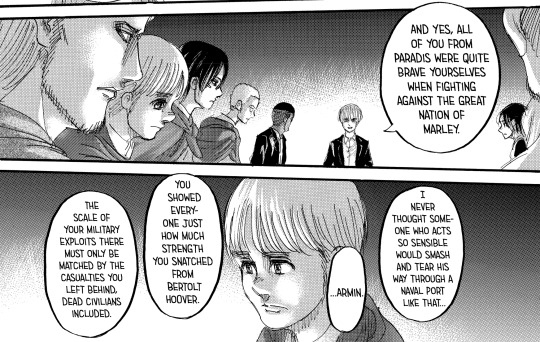
Notice how Yelena frames the raid as a nation wide attack? Except, that's not what it was at all. The Scouts only attacked the internment zone while Eren and Armin ravaged it and the port of Liberio respectively, two locations in one of the thousands of cities an empire as large as Marley must've had. And they did so to prevent Marley from gaining the means that would've allowed them to destroy Paradis. As for what Reiner and Annie did to the walls and their people, Yelena's accusations are hitting the nail.
These issues are never properly addressed in the following chapters. Instead, they were used to lay the foundations for the "we're the same" fallacious dialogue. Isayama didn't have to throw every single Scout in the same gray soup as the Warriors since they've already proven to be complex characters in the previous arcs. His own writing didn't support it. Imo, that's why he failed in this regard.

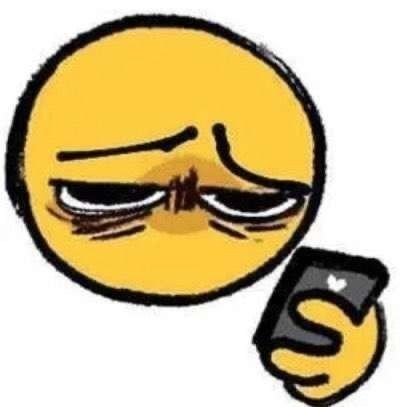
The campfire scene is a highlight, that one thing is true. It's extremely important for Jean and Marco's relationship. Marco wasn't just Jean's most significant person throughout the series (aside from his mom), he was also his most significant loss. A wound in his very being.
Not knowing what truly happened to Marco, what were his last moments, was an open wound on its own. When Reiner finally confessed, Jean had the closure he'd thought he'd never get. Now he could start the long process of healing - partially, because such pain never truly goes away. You just learn how to live with it, and Jean already has plenty of experience in that field. I think this is a very powerful message, important too. Grief is not something inherently bad. It's up to you what you do with. You either allow it to consume you, or you hold it tight, you cherish it as a sign that what you had was real, still is real, you let it shape you into a better person, one that understands pain and wishes for no one to have to go through something similar. Jean is the latter, ever the kind-hearted man.
This should have been Jean and Marco's intimate moment, but Reiner intruded on it with his self-pitying babbling. There are lines that mustn't be crossed. That's when Jean snapped and attacked him. He didn't do anything after he learned the truth, just told Reiner to shut up, which he didn't do.
There's a glaring difference between Jean's reaction and what Reiner did after Marco overheard his discussion with Bert, what he did after Marco begged him to talk it over, to talk with him. He executed him like an animal; worse than that, he betrayed him, crushed his soul, denied him any chance of survival, left him behind for the titan to finish the job.

Marco was kind, understanding, supportive, good-natured, bright, forgiving, a true leader worth following. He wanted to serve the king because that's how he thought he could serve his people best (this is clearly inspired by the relationship the people of Japan had with their emperor before he renounced his divine status). Yes, he was also wrong about some things he didn't have the chance to understand as one of the early deaths. But Marco represented something we should all strive to be: a good human being.
On the other hand, Reiner strived to be a hero. Someone who'd wipe out all the devils. Someone driven by selfish ideals that have been shaped by prejudice and hatred. Only a monster would kill someone like Marco. As I said earlier, he had other choices to deal with him. He already broke his legs, so Marco would've been entirely dependent on his help to survive. Reiner could've coerced him to keep quiet or else Bert would kill everyone with his shifter ability, or even force him to aid Annie with gathering intel in the inner walls. Reiner knew Marco wasn't stupid, he would've complied with his demands, if not to save himself, at least to prevent a disaster. And yet, Reiner still chose to murder him, a choice that only a monster could make, a choice that would ruin his mental health, a choice that would turn him into a shell of a man.
If there's one character that is bound to Marco by trauma and guilt, it's Reiner. He was no hero as his story was written with the blood of his many victims. Killing Marco forced Reiner realize he was the monster all along, not the people he was sent to exterminate. Not the people he didn't see as people. His trauma was so egregious because he couldn't face this monster that would murder someone like Marco, - and once he did - because he couldn't stand this monster that was he. Quite ironic to say that Marco symbolizes naivety while the hero that never was was falling apart as the realization of what he did started to kick in. Hard.
Combined with this realization, that choice would make him do the right thing in the end. To me, this was the whole point of Reiner's character arc. To stress the idea that a single choice fueled by hatred has an unmeasurable weight and only leads to unthinkable consequences. It's about doing the right thing after constantly doing the wrong thing. It's about showing that there is no us vs them and that the dehumanization of the Other only leads to mass destruction and self destruction. Change is not impossible as long as you keep moving forward and you give meaning to pain and guilt. Unless you stand for nothing, kill for nothing, and then die for nothing, like Bert did. A literal representation of the quote "Apathy is death". Or end up as self-centered as Annie, to the point where you'll unapologetically say you'd do it all again. Instead of saying you'd try to change your actions. But Reiner did change. He joined forces with Jean and the rest because he was finally able to see them as what they always were: human beings whose lives are just as precious as all the lives in the world. And that his own life might still be worth something. Reiner hurt Jean far too deep to fully reconciliate, but they were no longer divided by hatred.
Take away the impact Marco had on him and you'd do Reiner a great disservice.
Jean could've also chosen to do some things different. He could've returned to the camp and kill Reiner and Annie in their sleep. Cut off their heads and return back to Paradis as a hero, and finally have the quiet life that he wanted, but he didn't. Or he could've stayed in that forest for the rest of his life, to hell with everyone else, but he didn't. It wasn't because Marco's expectations had him on a leash.
Learning the truth about what happened to Marco, learning his final words made him realize that he became a man worth Marco's timely praise. And that man would never let resent, revenge, or retribution turn him into a monster. He is a man that always chooses to do the right thing because he strives against his own demons, and Marco is the person who helps him choose this life.
It's not trauma nor guilt that keeps Jean and Marco connected, it's love, be it platonic or romantic. How can it be anything else? Marco gave him this moment:
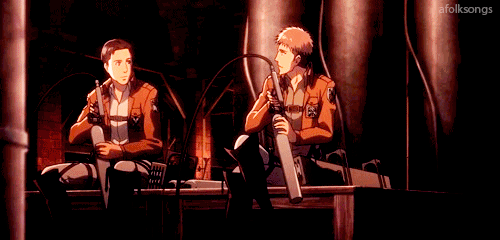
And before this, Marco told him he's cut out to be a leader. Marco told him "I'm alive because of you". Marco made him smile for real. Do you know how much of an impact just a few words of encouragement can have on a 15 years old boy with low self esteem and no real purpose in life? He'll never forget them for as long as he lives, especially if they're coming from someone who means a lot to him. How can you take something as meaningful as that and turn it into something ugly? Marco gave him clarity.
Marco's neither a blessing nor a curse. Especially not the latter. This is how Jean remembers him four years after he had found his lifeless corpse:

Of all his fallen comrades, Jean only sees him. This is the face that Jean turns to in his darkest hours. The eyes that look back at Jean are soulful, kind, sincere, comforting. Marco's facial expression is warm and tender. You wouldn't tell this was a 16 years old boy who had died a most gruesome death.
It matters too little they don't have cameras in Paradis, no picture could reproduce Marco's image with as much love as Jean's mind does. And it matters that much when you think about how much symbolism there is in aot. None of this is coincidental at all.
Jean always turns to Marco for hope, for strength, for solace, and to remind himself of his own kindness, that in a world as cruel as that of aot, there's still love and there's still light, if not outside, then within.
Marco's no curse, no blessing, no symbol, he is just a boy whose words and actions had a great impact on those around him, especially on his best friend (and dare I say, soulmate) who misses him dearly. He left his mark on the plot and themes of aot, whether you want to acknowledge that or not.
Edit: Forgot to add this (my drafts are a mess):

I do agree that Jean saving Reiner's life is important. No, they could never go back to being friends. Who'd be friends with their best friend's murderer? I'll say it again, Reiner hurt Jean far too deep for them to ever fully reconciliate. Besides, Jean himself stated that he could never forgive him for what he did. The logic is sadly not logic-ing with this one. But that doesn't mean he cannot see Reiner as a human being. The difference between Reiner and Jean is that Jean always saw everyone as people.
It's important because it shows how far Jean has come. It's important because it shows how much truth was in Marco's words right from the beginning. Jean is humanity's best - not because he is flawless, far from it, but because this flawed man will always find the strenght to do what's right. Because when good men go to war, they don't see sides, not really, they see the horrors of their actions.
In a way, aot is Jean's story. And Reiner's. And Marco's. I still have plenty of criticism for this series, but the web of complex relationships between these three characters is one of the things that Isayama did right.
#jean kirstein#marco bott#reiner braun#jeanmarco#jean kirschtien#jean kirschstein#jean kirschtein#marco bodt#aot#snk#attack on titan#shingeki no kyojin
32 notes
·
View notes
Text
Ugh, I was looking back through the visual novel for "No Regrets", and I was laughing, because people always talk about how bad Erwin's characterization was in the OVA, but it's nothing compared to how bad Levi's characterization is in the visual novel. It frustrates me especially because I often see people, mostly, it seems, Erwin stans, or eruri shippers, citing the visual novel as some sort of "evidence" of Erwin's influence on Levi, wanting to credit Erwin with Levi becoming a "better person" or with "creating Levi". They'll complain all day about how bad Erwin's characterization was in the OVA, but they won't say squat about Levi's characterization in the visual novel, and will instead use it to push their agenda of making Erwin seem superior to him, or more significant to Levi's development than he actually was.
This never gets talked about, but it's pretty clear that significant changes were made, both to the manga and the OVA adaptations, to fix Levi's characterization, because it's pure trash in the visual novel and they knew it. It makes Levi seem completely self-centered, to the point of not caring at all about what happens to Furlan or Isabel in his pursuit of his revenge on Erwin, which completely goes against everything we know about Levi. And no, this isn't down to Levi "growing" as a character or changing for the better later on. It's just bad characterization, which, again, is why they made so many fundamental and significant changes in the manga and OVA. They knew it was bad. They knew it completely mischaracterized Levi's core personality and traits.
A good example of how they fixed that characterization in the manga, especially, is that in the visual novel, when making his choice to go after Erwin, Levi completely dismisses Furlan's protests, snidely telling him and Isabel that if they stay together they can "at least handle one titan", and harshly tells him that he's the one who gets to decide, before dashing off without another word. He shows no concern for Furlan or Isabel's safety, no concern for the squads safety, no consideration for the reason they'd come to the surface in the first place, which was to give Furlan and Isabel a better life and actual opportunities to achieve more than just simple survival. It's so out of character, it's actually absurd. But in the manga, we see Levi's deep, internal struggle over his decision. It isn't a willful or irrational choice he makes. It isn't thoughtless. He cycles through all the various factors involved. He remembers Furlan's dream of coming above. He remembers Isabel's words from the night before, about how she understands why the Scouts do what they do, expressing a wish to find some similar purpose, he expresses his own concern for, not just Furlan's and Isabel's safety, but also Flagon's and the rest of their squad, ultimately concluding that if they all stay together, they'll be safer that way. He makes the decision to go after Erwin alone, and doesn't demand Furlan listen to him because "I'm the one who gets to decide", but asks Furlan to trust him, the way Furlan asked Levi to trust him and Isabel before. It isn't a power trip, or a revenge fueled blindness, or even pride that drives Levi to go after Erwin by himself, here, it's a desire to help Furlan and Isabel fulfill their own dreams, to give them that opportunity by taking the burden of getting the papers from Erwin himself, only implicating himself should he be caught. It's his desire for them to be safe, and for their squad to be safe. And yes, Levi felt a real hatred toward Erwin at that point, and felt a desire to kill him, but it wasn't that desire alone that drove him to make the choice he did. The visual novel frames it like it was though, and I absolutely despise it for that reason, and think it should be completely dismissed as a result. It's just one of the most glaring examples in it of Levi's character being completely butchered, but there's many instances throughout, which I talk more at length about in my analysis of "No Regrets".
But, again, Levi's characterization in it doesn't line up in any way, shape or form with what we actually know about Levi's character from the main, canon story itself. That's why I also feel like Isayama probably gave some input in the creation of the manga/OVA, because Levi's characterization is radically different in both, and much closer to who he is in the main manga. They made all of those changes deliberately.
Anyway, if anyone is interested in reading a more in depth analysis of all this, you can check out my thoughts here:
https://www.tumblr.com/cosmicjoke/694860600514363392/no-regrets-chapter-by-chapter-analysis?source=share
Also, here's my specific analysis of chapter 7, which goes into great detail about Levi's choice:
28 notes
·
View notes
Text
ATLA LIVE ACTION RANT/MANIFESTO
After watching it I started typing and couldn't stop. Sorry it's really really long and probably not very coherent.
(Since I wrote this, Big Joel put up a vid on his side channel talking about his thoughts on the first episode and he had a lot of points I agree with so watch that too if you’re interested) <- eta: ok jk sorry it already got taken off youtube it's only on his patreon now
I really dislike starting the story with the beginning of the war. It's like they don’t trust the audience enough to care about the protagonists without laying out all the Big Important World Context out right at the start, or they don’t trust us enough to understand non-linear storytelling. I’m trying really hard not to just hate on changes simply for being different than the show I grew up with, because god knows I have my own issues with it. There are scenes that are nearly shot-for-shot, line-for-line remakes of the original, which makes the parts they change really jarring and frustrating. I don't mind the way they combined some episodes or storylines or changed some details, like, June being the one who hits on Iroh instead of the other way around, but other changes just feel like they either miss something fundamental (to me) about the characters or the story or are just… arbitrary, which is almost worse.
One thing that REALLY frustrated me right from the start was that Aang wasn’t actually trying to run away. He goes flying to “clear his head” and gets caught in a storm coincidentally right as he says “ok Appa let’s head home”. Why? Everyone treats him like a coward anyway. Everyone is way meaner to him than in the cartoon about something that, in this version of the story, objectively was not his fault. Why? In the cartoon, he feels intense shame that he wasn’t there for everyone, even though he was twelve and about to be taken from the only person that wanted him to have a childhood, and he got so overwhelmed and scared by what the world expected from him that he tried to run away from it. In the live action, he gets to reunite with the spirit of Gyatso, who says, “you couldn’t have done anything if you had stayed. You just would have died,” (paraphrasing bc I can’t be bothered to give it more views just to get exact quotes) which is fine, I don’t think he needed a spirit world reunion with Gyatso but I can accept it. But if that’s what that gives Aang closure, what is the point of changing him to be less responsible for disappearing? In the cartoon Katara is the one who reassures Aang and helps him process his guilt, representing the people of the present who he can still help. The live action has the voice of the past, the people that he’s ‘failed’, reaching forward in time to absolve him of any sins. And remember that in this version he literally was trying to go home. It just feels like they’re trying to remove moral complexity from his character.
Less importantly (except to me maybe) I think that showing us the Air Temple pre-genocide removes impact of seeing it for the first time in the cartoon. I loved Aang hyping it up to Katara and Sokka, unwilling to believe that it could have fallen. It almost makes the viewer think maybe some of them could have survived in secret. Then, the contrast between his idyllic memories and reality start to sink in. It was an incredibly hard-hitting moment, dulled in live action by the audience having seen exactly what happened to the temple already (including an incredibly hamfisted “you can’t beat us while we have the power of the comet!” line from who I think was Sozin.) I think Momo is pretty cute though.
Another thing that pissed me off was the way they handled the Agni Kai: They combine Zuko's duels with Zhao and Ozai into one, where Zuko not only fights back against his father but gets an opportunity to deliver (presumably) a winning blow and hesitates. This choice weakens important aspects of his backstory and, to me, flattens his relationship with Ozai: 1) That he was never a prodigy firebender like Azula, feeding the inferiority complex that Ozai fostered 2) The Agni Kai was meant to be public humiliation, meant to teach Zuko ‘respect’. It was in front of hundreds of people, and it was a thirteen-year-old child against a full grown firebending master. Zuko prostrates himself and begs his father for mercy. His refusal to even fight embarrasses Ozai by exemplifying the 'weakness' Zuko's mother 'instilled' in him. In his duel with Zhao, Zuko makes a conscious choice to be merciful despite Zhao telling him to “do it” and kill him. Despite knowing how the fire nation views it as weakness, as cowardice, especially in this specific setting. It foreshadows his later choices, and shows his innate kindness. Combining the two duels doesn't allow us to see that parallel nor that growth. Reducing his act of mercy to a mere hesitation in the moment of victory, furthermore, reduces his agency.
In fact, the adaptation softens a lot of Zuko's role as an antagonist, giving most of his actually villainous actions from the cartoon to other characters. They keep him capturing Aang in the South Pole, but Zhao leads the attack on Kyoshi village, they remove the episode with the pirates (s1e9), combine aspects of episode s1e15 ‘Bato of the Water Tribe’ with ‘the Blue Spirit’ (s1e13) and ‘the winter solstice’ (s1e7/8) removing three instances of Zuko capturing or attacking Aang in favor of one with Zhao capturing and Zuko rescuing him. But I guess they add a fight in Omashu. Look, this is inevitable as a result of combining 20 episodes into 8. I don’t really mind streamlining a lot of these episodes, nor removing others (having episodes like ‘the great divide’ and ‘the fortuneteller’ only referenced as rumors Zuko hears in a bar is cute, to be honest), though the change to the Bato episode where Sokka merely has a flashback of his father implying he thinks Sokka is an incompetent warrior is a really unnecessary and bad change, to me. But they took out almost every instance of Zuko posing an actual threat to Aang and replaced it with one fight scene in Omashu. To me, what it feels like is the show runners know Zuko is going to become a Good Guy and thus they don’t want to make him act too Bad.
On the topic of Kyoshi island: giving Aang a reason to go there aside from wanting to ride the giant Koi, whatever. Removing Sokka’s chauvinism, okay, I guess. But it ends up replaced with extremely awkward flirting between him and Suki that feels motivated by nothing beyond each being the first non-relative young adult of their preferred gender either one has ever met. Whether or not you want to have Sokka start off sexist, and that could be a whole conversation on its own, him humbling himself enough to ask Suki for instruction was an important moment of growth for him that he doesn’t really have in this version. And they don’t even put Sokka in the dress and makeup!!! BOO! Also minor moment but I think it’s also sus for the show to have Suki remove her makeup as soon as it’s time for her to be a love interest and then just not wear it again. BOO!! She looked really cool though. It’s not like I think her first appearance in the cartoon is full of depth or whatever, and I think the cartoon turned her into a cardboard cutout as soon as she became a love interest, but it’s like the live action clipped through a wall straight to my least favorite parts of s3 Suki. It’s just disappointing. I also don’t like Aang being able to just talk to Kyoshi and his other past lives so easily but that might just be my cartoon-purist talking.
I didn’t mind putting Jet and Teo into Omashu, even though I think Danny Pudi’s ‘I had no choice’ justification for working for the Fire Nation holds up less well when he’s in a position of privilege in an Earth Kingdom stronghold as opposed to protecting a community of refugees in an isolated air temple. I don’t think they needed to add the Cave of Lovers plot from season 2 into the mix though. Not only that, but to rework that plotline so that 1) Aang isn’t even there, 2) it’s Sokka’s idea to put out their lights and follow the crystals, 3) that’s not actually The Solution 4) badgermoles can sense…. Emotions???????? Sorry that’s so fucking stupid it makes me angry. They include the legend where Oma and Shu learned earthbending from the badgermoles, so why would these giant creatures have learned to sense human emotion instead of the pre-existing explanation from the cartoon: sensing the world through the earth. You know, the thing that connects them to Toph’s earthbending. I guess setting up stuff as far away as… next season… isn’t important. They used the stuff from the season 2 episode “the swamp” for aspects of the winter solstice plot anyway, which is where Aang originally had a vision of Toph and thus was able to identify her as an earthbender in spite of her appearance. I guess they can come up with something else, but it’s just a decision that feels arbitrary. Sokka could have had his flashback without the spirit vision, but since this is before he meets and loses Yue they needed something, I guess. At this point I’m describing these changes not necessarily because I think they’re inherently bad but because I want to describe how fragile this jenga tower is getting, and how unnecessary they feel.
Ultimately it’s like… the things they’re the most faithful to are all the most surface-level easter egg references, while missing or changing the actual soul of the source material. Gran Gran gives the opening monologue word-for-word because Fans Will Get It. They include Bumi’s rock candy trick and lettuce leaf joke but make him resentful and angry at Aang for no reason I can understand. Sokka isn’t sexist anymore, he just has issues where his dad apparently thinks he ‘shouldn’t have lives in his hands’. Ozai is… wait- is he tearing up while he scars Zuko’s face?
I know we all love Daniel Dae Kim but we did not need Ozai so much this season, let alone Azula, let alone Mai and Ty Lee. We especially didn’t need a scene where Ozai praises Zuko to Azula while belittling her. For the record, because people defending this scene seem to think the issue is that the rest of us fail to understand that Ozai is playing his children against each other: That is not the issue. It’s that he did not play his children against each other in this specific way. He uses Azula to show Zuko how much he fails to measure up and threaten his position as heir, and he uses the example of Zuko’s failure to keep Azula in line. If she’s good enough and Zuko is bad enough maybe she’ll become heir. After all, that’s what happened to Ozai and Iroh. They are allowed to change this dynamic in adaptation but personally I think it’s a change for the worse, and the shot of tears in his eyes as he abuses his son lends credibility to an interpretation that maybe he does want Zuko to succeed. Lol. The cartoon focuses on Iroh’s reaction, his inability to watch, instead of Ozai’s… emotional conflict? Or whatever.
Katara and Sokka getting stuck in the spirit world as a replacement for their fever in The Blue Spirit is fine, I think condensing that plot and the winter solstice works decently. It’s fine that they changed Aang’s motivation for finding Roku to be getting info on how to save his friends instead of getting crucial info about Sozin’s Comet. After all, they clumsily introduced that in episode 1. It’s honestly fine (Read with as much cope in my voice as you want.) Combining that with Zuko’s half of The Storm is also…. Okay, even if I’ve already described why I don’t like how they adapted Zuko’s backstory. What frustrates me is that The Storm parallels Aang and Zuko’s backstories in a way that works really well with the events in The Blue Spirit. In fact, they’re back-to-back episodes. But the live action has moved Aang’s backstory to the beginning of the first episode. So instead of getting to see how they’re both constrained by the roles and times they were born into, and how heavily others’ expectations weigh on both of them, we have to have Aang explicitly spell it out for us. Rewatching these two episodes of the cartoon I was just really struck by how efficient the storytelling is. All Aang has to say after he’s saved Zuko is that he misses his friend from the Fire Nation, and that he wonders if he and Zuko could have been friends if they’d been born into a different time. All Zuko has to do is attack him in response. Because we’ve just seen why they can’t be friends in this time, in this world. The live action has to create some plot point about Aang having stolen Zuko’s diary, and Zuko having researched Airbender culture or something. They bond a little bit over brushes before Aang goes like ‘why don’t you turn against your family?’ The conversation (before that part) is cute, just like, not a good replacement for trusting the audience.
I guess once we’ve gotten this far it doesn’t matter much that Katara and Sokka have been captured by Koh, because of course they were. Yeah, they changed how it works, yeah, now he steals your face once you’ve succumbed to despair or something. Whatever. At this point it feels like nitpicking to point out that what made Koh so scary was that he would steal your face if you showed him any emotion at all. Who cares anymore.
^ok I wrote most of that before having seen the last two episodes, which cover the last three episodes of the first season of the cartoon. Dude it got even worse somehow. It’s been a couple days and my friends and I rewatched all of s1 of the original show in the meantime.
First of all, the changes to the dynamic between Hahn, Sokka, and Yue were completely inexplicable to me. Yue gets nominally ‘empowered’ in the sense that she’s no longer trapped in an arranged marriage to a total shithead, but at the same time they made Hahn seem like a… genuinely good guy? He’s humble, asks Sokka for his expertise, and nobly accepts that Yue broke up with him. When asked about it, Yue says ‘he’s great, he’s just not the guy of my dreams’, before kissing Sokka. (They also reveal that she was the sexy fox spirit that flirted with Sokka in the spirit world —I didn’t mention it before because I didn’t think it mattered at the time— so I guess we are meant to believe that Sokka is the boy of her dreams. Which we know from these two and a half conversations that manage to be way less cute than the awkward/shy flirting from the original show.) Even if they wanted to completely change Hahn’s character, Yue’s conflict in the original show was between her heart and what she saw as her responsibility to her people. They could just as easily have kept that element: that she isn’t in love with Hahn, but that for Political Reasons can’t just break things off. That’s way more interesting! But I do love a forbidden romance, so maybe that’s just me. The adaptation does say that they were at one point betrothed, which raises more questions than it answers. If both of their parents were anticipating this marriage so much that they set it up years in advance, why were they okay with her just breaking things off because she didn’t like him like that? Are arranged marriages in the Northern Water Tribe (I’m so sorry I forgot the name they gave it in this adaptation) purely meant to be love matches? There’s no financial or political element at all? Even for a princess? Whatever. Hahn still dies, this time it’s just offscreen. This time I’m actually a little sad for him, if just for his wasted potential.
They actually take out the engagement necklace stuff altogether, including the history between Pakku and Katara’s grandma, and the story of how and why she fled. I don’t really know why but maybe they thought “you lost the so-called love of your life to backward practices” was a weak reason to change his mind. So instead they have it that he doesn’t change his mind but it turns out Katara doesn’t need a master anyway because she’s already good enough to be a master! Despite not having been able to waterbend ‘more than a thimbleful’ before meeting Aang, and us not really getting to see her train at all. Gran Gran gave her the waterbending scroll she stole from the pirates in the cartoon, so I guess we can assume that contained everything you’d ever need to know. She loses the fight but wins the hearts and minds of the people. The women of the tribe support her when she goes against Pakku and go “we want to fight too!” Oh, did I mention this is all after they realize the Fire Navy is at their doorstep, so it’s less a fight about the right to learn waterbending than about the right to fight in war. And then again the issue of Katara needing to learn from Pakku is sidestepped by her magically being good enough now on her own. I don’t actually mind the change to include other women from the North standing up against sexism but to be honest I don’t understand taking out the betrothal stuff. It was a deliberate parallel in the cartoon- women trapped in loveless arranged marriages and also forbidden from learning any waterbending aside from healing. But whatever, it’s a choice. I can live with it.
What I don’t like is the way they’ve undermined Katara’s journey in season 1. Aang teaches Katara how to waterbend at first, and she also doesn’t learn to heal on her own before an elder shows her how to do it. In the cartoon, she’s been trying and figuring things out on her own all her life. Her hunger to find someone to teach her is a major motivator for why she wants to go to the North Pole. We see her struggle, get intensely frustrated and jealous that Aang picks up waterbending more naturally than she does, and work really hard at it. Her dedication and hard work are what Pakku eventually praises about her when he teaches her. He compares her to Aang, who is naturally talented but distracted. This is after an indeterminate amount of time, but whatever, condensed timeline, 8 episodes, whatever. We don’t even see Aang waterbend at all this season, which is kind of wild to me. I guess if you take out the Summer Solstice Comet deadline to master all four elements (which they did) Aang doesn’t really need to rush. Instead they kind of just have Aang have a thing of like “I have my friends to help me” which is….. ok….. Oh wait, is this why they don’t care that much about foreshadowing Toph? Are they just not gonna bother having Aang learn the elements and just have her show up and join them for whatever reason? Is that why they just totally removed ‘The Deserter’? Wait sorry, I’m assuming they’re planning that far in advance at all, my bad.
Okay also like I have to talk about this because it bothers me so much. Zhao was handled so badly. Whatever, have a Fire sage just give him the moon/ocean spirit exposition in a flashback instead of the way it unfolded in the cartoon (I guess we’re already not bothering to set up the great library since the gaang already met wan shi tong, I guess that’s… fine… Appa can get captured a different way, if they’re even going to bother with that plotline in season 2. If they’re even going to do a season 2.) Sure, the moon and ocean spirits are only in the physical realm and vulnerable for ‘only one night’ now as opposed to permanently. Zhao knows this but not that they’re fish. Okay. Whatever. Blah blah blah. Those are personal nitpicks. But what really gets me is that in the end, Iroh and Zuko kill Zhao. Or rather, Zuko doesn’t finish him off, Zhao tries to attack when his back is turned, and Iroh finishes him off (similar to the way their Agni Kai in the cartoon plays out.) In the cartoon, Zhao and Zuko are fighting, Aang-as-Ocean-Spirit grabs Zhao, and Zuko reaches out to try and help Zhao, which Zhao refuses. He chooses to meet his fate at the hands of the spirits he provoked rather than swallow his pride. This is such a good conclusion to Zhao’s character! The live action also fails to set Zhao up as a formidable firebender, which is also not strictly necessary but I think complements other elements of his character well. His first episode in the cartoon includes the Agni Kai between him and Zuko, establishing Zhao both as a firebending master and as someone who values his ambition and pride above all else. In s1e16, ‘the deserter’ we see him as the embodiment of fire’s destructive hunger: he is baited into destroying his own ships in his desire to “win” his fight with Aang. He gloats of how his siege of the North Pole will earn him a place in the history books, and to win he is willing to kill the moon, against Iroh’s exhortations. In the live action, we get a weird revelation that he was working with Azula, and she was the mastermind behind a lot of his plans? Huh? He also “reveals” that Ozai was only ever using Zuko to “motivate his sister”, which is both incredibly heavy-handed and completely redundant. I guess I should mention that the finale has a couple scenes thrown in where Azula is doing firebending training to pass some kind of arbitrary Test Ozai has set for her, while Mai and Ty Lee watch and tell her that her dad is like, being way too hard on her and she knows he’s manipulating her right? Thanks girls!
Anyway, I guess since the live-action completely removed the golden child/failure dynamic between Azula and Zuko we needed something to replace it. The “my father always said Azula was born lucky. He said I was lucky to be born” line summed up that relationship dynamic nicely. Oh well, who needs it. Instead Zuko is good enough to have beaten Ozai in a duel at 13, but Ozai decided he was weak for hesitating. Meanwhile Azula is struggling to meet his expectations. He banished his heir on a mission that, for the last hundred years, was considered a complete dead-end, so that he could, uhhhhh, Motivate her when he miraculously started succeeding. Masterful gambit, sir. Okay sorry to harp on that again. Back to Zhao. Actually, what else is there to say. He has a couple funny lines but he’s just not the same guy at all on either a superficial or deeper level. It’s so disappointing. It’s also just a really weak choice to make Iroh and Zuko responsible for his death. Maybe they couldn’t figure out how to make the special effects look good when the ocean spirit picked him up. It just misses the point of Zhao’s ultimate tragedy, to me. The man so lacking in self-control, so ambitious, so assured in his own superiority, that he saw the spirits themselves as his prey. To be destroyed by the forces he tried to destroy is so poetic! Instead let’s water down Zuko’s mercy and Iroh’s pacifism.
This is all I can remember at this point aside from nitpicks. Do I think the Koh vs Kuruk backstory needed to be spelled out like that? No. Did we need to almost have Momo DIE to get Sokka and Yue to the oasis? Not really. I don’t think the way Zhao “assassinated” Zuko in the live action made as much sense, but we took out the pirates so oh well.
When you get to a certain point I guess the question becomes ‘how much can you change in an adaptation and still call it an adaptation’. What do adaptations owe to their source material? Where does the spirit of a story reside? If the same plot beats happen, does it matter if characters are different? If the characters are faithful, does it matter if events are moved around? If the destination is the same, how much does it matter how you get there? What do I personally want to see in a ‘live-action’ adaptation of Avatar, this show that I loved so much growing up? Well, assuming that “don’t make one” isn’t a possibility, I would have preferred they follow more in One Piece’s footsteps. That adaptation wasn’t perfect either, and it condensed around 100 chapters of manga into 8 hours, but it really felt like it got the characters right. Avatar had a tough job too, but it condensed 7 hours 40 minutes of cartoon into 8 hours of- wait. No. Well at least we got the cabbage merchant.
#u guys dont even know how much the original shaped my adolescence....#for that reason i was probably the most annoying person possible to watch the remake with#thank u to my friends
27 notes
·
View notes
Text
Little but Fierce V
Now, say what you want about Meryl (and I am. And have. And will. At terrifying length) but she doesn't lack for conviction. She may be lacking survival instinct, and sometimes the common sense God gave an eggplant. But never conviction.
She's a scold. But I'll say this about her lectures: there's truth to them, and people feel compelled to justify themselves hearing it.
How can you be so heartless?! Who does this to someone who saved their town twice? It's unthinkable!/How can you be so cruel? You would sacrifice the man who saved your town twice? It's heartless!
How totally lame. It's not an act of kindness. You're just running away from pain./It's lame, not an act of kindness. You just don't want to get hurt. Running away isn't some brave thing to do.
Meryl's got a knack for putting her finger right on the conclusion that others are reluctant to come to about what they're doing - what she's not good at is understanding why they're doing it anyway. Meryl's never had to surrender anything in order to survive. She doesn't know anything about compromise, nor about bending the rules, nor is she aware that one obvious motive can conceal another hidden one. She simply sees a fault and she wants it corrected on demand. And no, crying won't help.
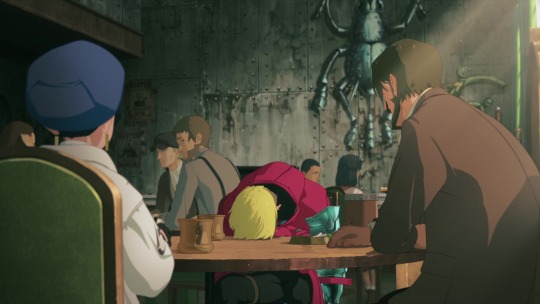
Rosa doesn't want to hand Vash over - she does care about him. But in her mind, a choice between him and her child is no choice at all, and they hang on such a slender thread of resources as it is that they're forced to maximise what they've got however they can. I imagine something similar was what separated Rosa from her husband. Vash completely understands it himself, because it's what Rem believed: her own life or those aboard the fleet? No choice at all.
Similar Vash fleeing the Nebraskas, which both Meryl and the father conclude is cowardice - he's a cream puff, a loser, a weakling who can't fight. Vash is none of those things. He's drawing them away from the town, ensuring there won't be unnecessary casualties and distracting them from, say, stealing the Plant. It doesn't quite work, but it does give them time to reconsider what they're doing and ultimately they change their course. Which, to her credit, Meryl comes to be impressed by, in a... Meryl sort of way.

What a weirdo...
But both Rosa and Vash are fundamentally pragmatists. They understand doing what you have to in order to survive, whatever it takes, because they've both been in circumstances that make those demands a matter of life and death.
Sheltered Meryl, without knowing it, sees a logic that neither one would naturally consider: one that is uncompromising.
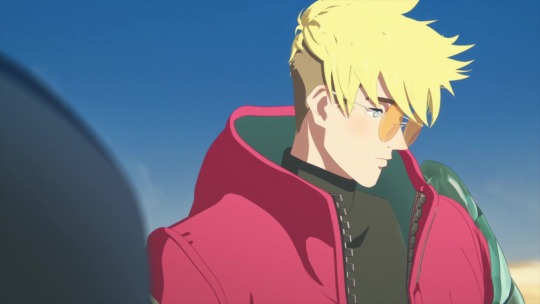
It doesn't matter that Rosa is only betraying Vash for the sake of her people - she's still betraying Vash, who has only ever helped her out, and that will demand a reckoning. Similarly Vash trying to misdirect the Nebraskas. They hurt plenty of people and cause a huge mess (and eat up time, which Vash could use to escape what he's really running from…) while he tries to convince them to stand down. If he'd faced them then and there, the town might have been better off.
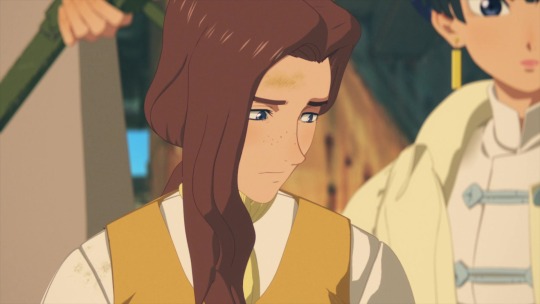
Because that's the kind of world No Man's Land is. It's one great big double-bind. Either be judged as you dirty your hands and break your principles, or face the judgement of the elements, which do not forgive.
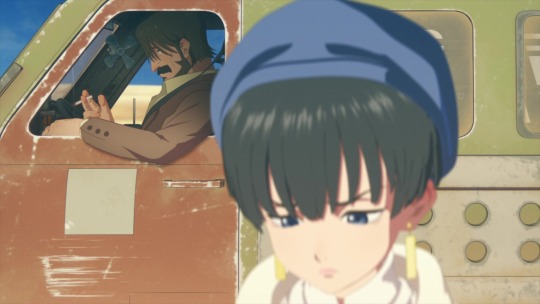
Meryl's perspective is strict, but it's uncomfortably hard to argue against the conclusions she comes to. And both Rosa and Vash know it.
It's interesting that Roberto actually speaks up the second time, though, telling her to cut it out. At the end of ep 2 he's the one who grows annoyed enough with Vash to be the first to ask him "Whose side are you on?" I wonder what made him change his mind?
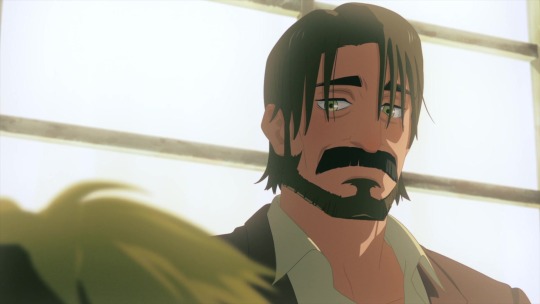
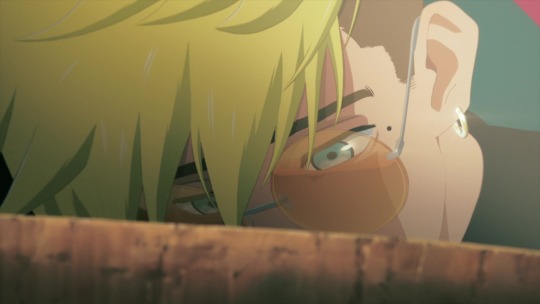
Part I
Part II
Part III
Part IV
Part VI
Part VII
Part VIII
#tristampparty#trigun stampede#trigun meta#“what a weirdo” has the same connotation as “i'll take that as a compliment”#i.e. whoops i have admiration for this blond lunatic#meryl stryfe#meta: little but fierce#roberto's thoughts can be hard to decipher but i think he's seeing through vash's hapless façade here#to the genuine helplessness
31 notes
·
View notes
Note
How do you think Davy Jones and Calypso met? What do you think about their relationship ?
HWOAGGHH okay so let's get right into it
Supplemental POTC sources talk about Davy Jones basically being this incredibly skilled sailor likely from wealth and means who was able to impress Calypso and gain her favor through his seafaring abilities
It's a cool origin story and I've played around with it in fic, but I've always wondered what SPECIFICALLY about him caught her eye, because he wasn't the only great sailor of his time---like, he'd have to have done something absolutely bonkers in order for the goddess of the sea to take notice
I love hearing headcanons about this, but the flavor of origin story I've ascribed to him in most of my fics is "humble beginnings" / tragic war history / desertion / escape to sea
In my stories, what Davy Jones brings to seafaring and captaining his own ship that is interesting to Calypso is both a humility about his place in life and an obsessive devotion to the sea as the one thing worth living for / keeping him alive
He's not in it for profit, he's in it for survival and ends up aiding others---I have the Flying Dutchman (visually of Dutch design, 16th century, built like a slave trading ship) taken from Dutch slave traders at the height of their operations and the captives freed, both as a practicality on Jones' end (incredibly useful type of ship that balances speed and firepower) but more importantly as a compassionate act. There has to be a reason why Calypso chose him for the most compassionate role in the world, the most essential job in easing the dead into the next life.
I don't think that it's a coincidence that Calypso appears in the mortal form that she does, I think that witnessing men's greed as the soul of the sea has made her particularly sympathetic to the atrocities of the stealing and transport of West Africans to other parts of the world, countless of whom drowned and chose to throw themselves into the sea rather than face a life of subjugation. THIS resonates with her, this makes sense to her, her entire story is about having her freedom taken from her, and for that I deeply appreciate the casting and characterization choices they went with canonically, because it lends itself to such rich meta analysis. A lot of fan characterizations of Calypso paint her as completely discompassionate, uninvolved, and uncaring about the world of men, but I do not agree with this, I see her interest in humanity being much more complex, with hate, reverence, love, and disdain all mingled together
And that's ultimately why Jones stands out to her first, because he is one of the few/only people at sea not for profit, his freedom is wrapped up in the sea, and he has enough of a broken past that makes any kind of devotion he displays deeply and overwhelmingly all-or-nothing
It's this that lends itself to the imbalance of power and lack of compromise between them, which then leads to the betrayal, etc etc. But they are at the core of their relationship the two people who understand each other more than anyone else in the world could, but they are still mired in misunderstandings because they are a human and a god, because those relationships are doomed by nature of what they are, because you can never fully understand someone whose concepts of time, devotion, and reality are so fundamentally different to your own.
I love thinking about how terrible they are for each other and how no one else in the world fits better together than them. Their story is the most pivotal and interesting piece of lore to the trilogy, and ultimately the reason why I think P4 and P5 fell flat---because the writers kept scrabbling for something mystical and fantastical to try and replicate this, but nothing came anywhere close to reproducing that same love and meaning of the Jones/Calypso Elizabeth/Will contrast. Which I could also go on and on about but I'll stop here!
64 notes
·
View notes
Text
Geto and Yoshino parallel ramble:
Geto and Junpei parallels are so high in terms of the role they play in defining the themes and key events of the story. I feel like if Junpei survived, he would have written to be as a counter to Geto's character arc.
The biggest reason for why they remind me of each other is the way their death affects their associated main characters. Geto's departure and death transform the way Gojo sees Jujutsu society and his role in it, making him far more grounded and giving him a reason to help others who are weaker. Junpei's makes Yuuji see the dangers and unfairness of the world he's in, and how even a dignified death is something difficult to provide for people.
Geto and Junpei were both let down by the systems they were in. Geto's struggles were wholly unacknowledged by Yaga and any of the higher-ups in Jujutsu Tech. Junpei's suffering was noticed but no one did anything about it.
Fundamentally, they are both people who care for others. This is important in understanding their downfall.
Geto went to extremism because he thought he could protect people if he just tried hard enough. He understood that the strong hurt the weak, accepted it to some extent at the start and made it his mission to be the kind of strong person that would instead protect the weak. His motives are, even if simplistic and filled with issues, empathetic. Junpei says he doesn't believe that humans have hearts but its revealed that he's only led to this thinking because he can't stomach that any human being is capable of inflicting the cruelty he and his mother suffered through(also because Mahito guided him there).
They care way too much and that's what is used to break them.
Next, is how they are used by the special grade curses. Kenjaku is obvious, he's possessing Geto's body. Mahito's also pretty obvious, he used Junpei to manipulate Yuuji emotionally in order to bring forth Sukuna. In Shibuya Arc, Geto and Junpei are used to emotionally break Gojo and Yuuji(I'm not putting Nobara and Nanami here because they serve roles outside of the parallels I'm drawing between Geto and Junpei).
They are both characters who are broken by the systems that are meant to foster them, and are then used callously by curses to further chaos. I really want to know what kind of human emotion made Kenjaku, because I think it'd be something that works in an opposite yet complementary fashion to the cause of Mahito's birth; humanity's hatred for each other. I think it'd be like that because Mahito and Kenjaku have a discussion that's very important to the idea of 'humanity' in JJK, which is, the connection between 'the body' and 'the soul'.
Even more, Junpei was the prototype for all the sorcerers that were awakened during the Culling Games. Kenjaku brings up Yuuji as an example for the vessels, and I thought it was interesting to mention Yuuji and Junpei together when he was explaining the Culling Game participants. But I actually think Kenjaku counts as a 'vessel' (vessels lose autonomy, their souls are removed and replaced by a curse or sorcerer that was once alive and there is no way to separate the possessor from the body without killing the soul of the original).
In canon, they show the worst of human society and exhibit what can happen when you are let down and uncared for by the people around you. Their deaths happened because they were alone. Either out of choice or because they had no other options. In contrast, the lessons Gojo and Yuuji exhibited from these events was the importance of reaching out to people.
Gojo reached out to Geto and had an honest, private conversation with him before his final moments. Yuuji stopped attacking and listened to Junpei in his. Neither of these actions saved the characters, but they showed us that reaching out is important, even in the face of how overwhelming and awful the world can be.
JJK is a story about love, but it's also about the consequence of isolation and the power of community. Sukuna and Gojo are powerful, but they are overwhelmingly lonely. Yuuji calls himself a cog in the machine, and that sounds really bleak. The phrase is not used in any good context and is usually to show that an individual is detached or unimportant to the mechanism they're part of. But in this case I think a new perspective is needed. They are cogs that come together for a greater cause that they are all aware of and would eventually benefit them. Yuuji is surrounded by people who want to help him. It's what his grandpa wanted for him. Even if he dies physically alone, he'd have the hearts of others mourning for him and treasuring him.
Geto and Junpei died, but as tragic as it was they didn't die alone and their deaths made people reconsider the systems around them.
38 notes
·
View notes
Text
There are, in my experience, two big changes that adaptations of The Count of Monte Cristo always make.
One is that they always rearrange events so that the climax of the story is Edmond having a sword fight with Fernand. This, I think, says a lot about who adaptors think Edmond's worst enemy is and about what kind of story they think it is, or at least about what kind of story they want it to be, and what they think makes a good hero and a good villain.
(There's an essayist elsewhere on Tumblr who's been known to say that the key to writing Superman well is to understand that the only Superman villain who matters is Superman: he's so powerful that no external threat could ever cause him as much trouble as he could cause himself if he used his power maliciously or unwisely. Dumas writes his protagonist the same way: once Edmond has ascended to become the Count of Monte Cristo – transformed, rich, powerful, almost a god – his enemies are powerless to do anything he can't counter, and every problem that befalls him from that point on is a consequence of his own choices. But that means that the climax of the novel is him realising that he's made bad decisions and choosing to make better ones. Defeating an external threat by sticking a sharp piece of metal into it in a stylish way is so much easier to make an exciting climax out of.)
Speaking of happy endings, the other thing that adaptations always change is what happens in the end to Edmond himself.
I don't think I've ever seen an adaptation that ends with Edmond going off with Haydée. A lot of them leave Haydée out entirely. (Incidentally, my thoughts about what exactly Haydée is to Edmond at the end of the novel change every time I read it. I suspect Dumas intended it to be read as a declaration of romantic love, but I think there is room for other interpretations.) But I'm not sure I've ever seen an adaptation that offered an alternative I preferred.
Many of them have Edmond getting back together with Mercédès, which is a choice that I understand the attraction of but don't like; it's fundamental to my understanding of the novel that there are some things that, once broken, even the mighty Count of Monte Cristo can't repair.
Some adaptations kill Edmond off at the end, either because the author of the adaptation believed that was what he deserved or perhaps just because they couldn't think of a better alternative either. I've seen one where Edmond gets a fatal injury during the obligatory climactic duel with Fernand, and I've heard of one where Edmond survives everything but then kills himself at the end, convinced that he's done more harm than good. (I don't remember hearing what that version does with Haydée.)
There's one adaptation I remember being amused by – it was one of the ones with no Haydée, and I think may also have dropped out the subplot with Maximilien and Valentine – which ended, after the obligatory Fernand duel, with an abridged version of the scene where Monte Cristo sees Mercédès farewelling Albert from the dock at Marseille. He tries to suggest that they could get back together, she explains why she considers it impossible, and then she walks off, leaving him standing alone on the dock where it all started, with an expression of "Well, what the heck do I do now?" as the credits rolled...
#the cristo account#the count of monte cristo#the count of monte cristo spoilers#spoilers#for various adaptations as well as the original novel#suicide mention#not a reblog
70 notes
·
View notes
Text
Druckmann stating David is a dark version of Joel is a -10/10 take absolutely not okay because them being parallels implies they share many similarities… David acting as a reflection of Joel’s role (as many of the character’s we meet mirror Ellie+Joel’s position in the story), though, is a 11/10 choice. I believe the showed really emphasized this and yeah, I get it seems nit-picky, but it’s important to note how paralleling the two characters in such a way serves to explain how differently they approach the role of guardian and what could have been if Ellie had met someone else. Additionally, it’s leading us to the conclusion that even a a good person (read: parent) doesn’t always do everything right (*spoilers if you don’t know the game*)
Joel and David are both older male figures who appear to want to care for Ellie. They set these two up for compare and contrast through the role of a “father” figure (an older caring mentor who can be responsible for her). The word “father” is frequently used in ep 8 when addressing Joel as well as when David refers to himself, expressing how both of them are random men who found their way into Ellie’s lonely life. There is also a sense of obsession the two have towards Ellie and keeping her around that is followed be violence, which is utilized as an expression/form of love. Their motives and characters couldn’t be more fundamentally different.
Initially, Joel has no interest in helping Ellie and no expectation of trust. Joel’s conception of a father seems to be the universal expectation of providing, teaching, fundamentally caring for a child’s well-being. The only reason he begins to open up to Ellie is due to circumstance and the ghost of his daughter, who he feels he failed; the association comes with a deep personal trauma by unconditional love. Furthermore, this sense of care is entirely one of a parent, exhibiting care so great that his well-being and even the world doesn’t matter as long as she’s okay
In contrast, David is clearly beyond words off the rails messed up. He does appears to have little to no understandable morals, exhibiting little inhibition to resorting to cannibalism, physical intimidation, sexual violence, and pedophilia. What’s more, from what he insulates, this is not a result of the apocalypse, a breakdown of humanity — instead, this is a part of himself now freed. The apocalypse has not caused this collapse of morals, it has actually justified his propensity for the inhumane. David sees the violence in Ellie, but he’s partially confusing this inclination, which has been fostered by humanity’s collapse, extreme traumas, and general survival. Honestly, I’m not going to even try to understand his mind or why he would think it’s okay to kidnap and potentially try to make Ellie his partner — all that matters for this is how David sees this action as caring for her and views himself in a father role by doing such (he crazy so don’t even try to ask how he came to those conclusions)
On a related tangent (trust me here), ep 8 emphasizes religion quite a bit, most noticeably in the way the community is steeped in some form of Christianity and David is a preacher. Less clearly is this reduction of religion (or a faith in God) to faith in an individual. David, as we learn more about him, seems to have a God-complex, framing his himself as a savior and leader in his community; he utilizes religion to frame his actions as unquestionable. Furthermore, while the usage of “father” is frequent and in places implies reference to, it never directly mentions a relation to God. the opening verse that David reads (Revelation 21:3-4) is also supportive of this, as it states, “God is with men, and he will dwell with them, and they shall be his people, and God himself shall be with them, and be their God.” Not only is David attributing himself to a God-like status, but also this position of a “father” as a leader of faith in correlation with Ellie.
We have seen the way Ellie mimics Joel, like in the beginning of ep 8 when she threatens David and James over the deer. She gladly follows his “teachings” and even seeks them, shown in the way she continuously begs Joel to tell her what to following his incapacitation. She’s also only kid and this has been the first time she’s ever been loved in this way, so there’s no reason for Ellie not to feel okay with relying on Joel with almost blind faith.
But Joel is not perfect and he is not prepared to teach a kid how to grow up in the apocalypse. While Joel and David provide similar offers (at least from their first impressions), Joel will never take advantage of Ellie in the cruel way David would have. It actually highlights Joel’s humanity, and so, even when he is torturing and killing men for information on her whereabouts, this feels justified since Joel is a good man and a good father. Joel may cross lines, but it is out of necessity OR maybe he just doesn’t cross too many/the wrong ones, so we’re still able to stand with him.
Nevertheless, this conflict of morals (being a good person in a world where, really, you die if you’re good) has an especially strong impact on Ellie, who is only 14. A major theme of the game and especially so for the show is the concept of violence and idea that, in Ellie’s world, violence has become a show of love. Mazin himself states how Ellie’s tendency for violence has been enhanced through Joel’s presentations of care being through acts of violence, tracing this back to Joel killing the guard in episode 2. David says this plainly to Ellie, how Joel kills a man not defending himself, but defending her. The lines that should not be crossed are blurred; in the apocalypse, do they exist at all?
David, disgustingly enough, leads us the answer: cordyceps love through violence, this is not how humans love. “People need a father” and Ellie is not beyond that. David accepts we’re all animals, but Joel continues to teach Ellie what it means to be more than that through the way he treats her equally, he worries for her, he kills only when necessary (iffy, but at least it’s not out of enjoyment), and simply cares. Ellie has warped violence as a form of love, however, this is not all she knows, which is what makes the end of TLOU pt. II all the more poignant. *SPOILER* albeit stuck in a cycle of violence, Ellie finally decides to end things with her choice not to kill Abby. Though I don’t particularly like pt. II and don’t know if it was perfect enough to justify killing off Joel, I can appreciate the ideas behind it and think the emphasis on forgiveness is a powerful statement
#the last of us#joel and ellie#joel tlou#joel miller#Ellie#tlou spoilers#tlou hbo#tlou show#tlou#tlou meta#tlou game#tlou ep 8
60 notes
·
View notes
Text
Okay, so I think I'm starting to get my mind around why I don't really vibe with the theory that Luthen is a Jedi.
This show is intentionally choosing to make its characters morally gray. To muddy the waters of things that were previously shown to be pure and good, like the Rebellion. We see it in Cassian, obviously, but we also very much see it in Luthen.
And that's just not a place the Jedi can live. The Jedi do not get to be gray. The Sith do not get to be gray. Luthen's position of actively fighting tyranny and knowing that he has to do the dirty work in order to help more people in the long term just doesn't fit in with the way that we have come to understand either the Jedi OR the Sith. The Jedi won't let themselves actively oppress people and cause extra suffering intentionally, even if it's for a good cause. The Jedi would not have made the choice to sacrifice 50 people in order to keep one spy's identity safe so they could continue to use him. But it doesn't fit the Sith either, because from what we've seen, the Sith either revel in their darkness like Palpatine or actively lie to themselves about how evil they are and the choices available to them like Dooku and Anakin. Luthen's awareness of the dark deeds he's done and his misery over it, his belief that he is CONDEMNED by it, doesn't fit the Sith.
I think one of the reasons this show feels so unique and new is due to its morally gray themes and characters. The entire point of the story right now is that sometimes rebelling means you have to do things you aren't proud of, things that aren't entirely purely good. Sometimes just SURVIVING asks that of you when in a world under the tyranny of something like the Empire.
Cassian kills people, quite often. And does so without a lot of regret or remorse in the show so far. And he's not shown to be wrong for doing so, sometimes we're actually actively rooting for him to do so like during the prison break. He's not necessarily going to be a HERO of the story, he lets that be other people like Kino or Vel and later Jyn, but he is a GOOD PERSON. He isn't marred or condemned by his choices, even though in a lot of other Star Wars stories, he would be. Characters like Ahsoka, Kanan, Ezra, Obi-Wan, all have to live in a particular system due to being Force Sensitive that Cassian just... doesn't have to deal with. Cassian can BE gray in a way that the Jedi and Sith really just can't based on the worldbuilding.
The Jedi do not fit in this show. Which isn't to say that Star Wars has too many Jedi, I would never ever say that, I fucking love the Jedi and would love more stories focused on them (that aren't about people who choose to LEAVE the Jedi or their genocide, please and thanks). But I think that in order for THIS PARTICULAR SHOW to live in the place that it does, where characters can act morally gray, can kill and betray and not be villains because of that, the Jedi just... can't be in it. It fundamentally changes the story you have to tell if there is a Jedi in the mix. The Jedi don't get to be morally gray without completely falling into darkness eventually.
So I don't want Luthen to be a Jedi. I don't think it would necessarily make sense with the Star Wars worldbuilding for him to be able to do the things he does AND be a Jedi.
117 notes
·
View notes
Note
i love how you kept those major personality traits they have even in this au. where all things played different and the chances were less merciful but they still are who they are. like the fundamental thing for sirius, is that he is loyal to a fault (he will never beat the dog allegations) he is loyal and he will kill himself trying to be. and i love that you’ve preserved that. AND, from the outside perspective, like you said, reg is the brave rebellious one. and nobody really knows how it was their dynamic growing up. and the things sirius gave up, the things that were took from him. and i know remus already is in love with sirius and he KNOWS who he is, and a background isn’t really necessary for the intensity of this understanding. maybe. but do you plan in to give remus a glimpse of this background or anything?
thank u!! glad ur vibing w the characterizations etc <3 & as far as like. r getting more info on background/s & reg dynamics etc...i mean 2 a certain extent he's like. already picked up some info abt background within the fic so far--i.e., s saying (in a moment of vulnerability) that he didn't have a choice abt whether 2 take the mark or not, seeing the way s is completely willing 2 do anything 2 protect reg (like. he was completely unwilling 2 cooperate w or trust the order until he found out they were basically his brother's only chance of survival), seeing the fact that s's work w the d.e. does in fact eat at him & is not something he'd wanna do--even stuff like that scene in ch 15 where s cuts the head off the basilisk-human hybrid when none of them can stomach it; that also gives r some insight into like. yes he can do these horrible things but he's doing it to spare others from having to get their hands dirty, y'know? which is why r thanks him for it (though, of course, s interprets the interaction in a completely different way), bc he's seeing + understanding s in a new light, etc.
anyway. not sure whether i'll have like. any explicit "here's what my childhood was like" scenes but r's understanding will probably just continue 2 come piecemeal thru picking up on stuff like that...bits + pieces that change his perspective + give him some insight as 2 what was probably actually going on w s joining the d.e.
11 notes
·
View notes
Text
i really struggle to understand where the interpretation of gaster as a villain came from, to be honest. like okay, maybe when we only had a weird mystery man behind a gray door and not much else, i can kinda see why. in a game where villainy often doesn't seem to exist, i guess it only makes sense to ascribe it to someone who is literally intangible. but now... i just don't get it!
based on everything we've seen in deltarune, the impression i get of gaster is just a strange skeleton man, stuck beyond the boundaries of spacetime. he's someone that distantly appreciates the beings in the world he most likely had a hand in creating, and wants to share this experience with the player. at the very worst, he's just "mildly unnerving" due to the mystery around his (non)existence.
my best guess is that this might stem from a misunderstanding of the gonermaker sequence? recall that it's gaster guiding the player to create a vessel for themselves—a vessel meant to inhabit the light world. he's not the one who forces kris under the player's control; the vessel is discarded by a third party, who then asserts that "no one can choose who they are". the vessel is discarded, kris's body is seized: autonomy is stolen from both parties. this exact thing seems to be what gaster was working to prevent.
there are two opposing forces here: one on the side of the player, and one on the side of 'fate'. seeing the appreciation gaster seems to have for the player as well as their ability of choice, i REALLY don't think he's particularly fond of fatalism. don't forget that gaster seems to be aware of the nature of SOULs, including the power of determination: the force that drove the entire plot of undertale; the power that allowed the player to survive death—to subvert fate—and the ability to choose what 'route' they went on. fundamentally, deltarune's metanarrative appears to be about the immutability of a set story contradicting the inherent interactivity of a game: determinism vs. determination. neither side is 'evil', but each has its own narrative to push.
that being said, i don't definitely don't believe these interpretations of gaster stem solely from a metanarrative misunderstanding. unfortunately, i'm 99% sure the main motivation behind the vilification of gaster is simply that it gives the story an overarching 'antagonist', which it currently lacks concretely. this isn't a bad motivation, i guess... but it's just so hollow to me. gaster is the villain because the story needs one. he's just fulfilling fate. it's not that this WOULDN'T work at all—there are some circumstances where it might. i mean, forcing someone into a narrative they're desperately trying to subvert seems like a pretty bad situation to be in. maybe they'd start to crack. maybe they'd have no choice but to succumb. who knows! the possibilities are endless...
#i realize the end sounds like i'm saying 'if you keep being MEAN to gaster he's gonna GET you >=(' which is objectively hilarious#but that's not what i mean i swear </3.#OH forgot to include in the post but there's also another contradiction in the determinism/determination duality:#each 'route' is still predetermined; it's all written in code. these choices are not truly yours to make even when they're meant to be.#there's a lot of really interesting stuff going on there in that dichotomy. i enjoy exploring it a lot#i know for a fact i've talked about this topic here before but it's on my mind again. that's why i'm posting this at 3 AM </3
268 notes
·
View notes
Text
Trimax Thoughts Vol. 3 Pt. 1
Some more miscellaneous thoughts. I realized it's actually more convenient to do these before any analysis because. Well. I actually haven't read this manga before. Why was I trying to do full analyses before just letting myself read it. Why am I a dumbass.
Anyways.
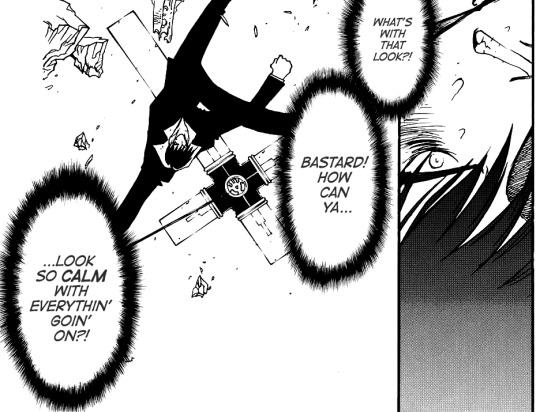
It's the repression my dude
(Ok but can we talk about how Wolfwood doesn't really lie and his eyes convey his emotions whether he wants it or not and he still feels strongly because that attachment keeps him going and then how Vash has had to withdraw and shove everything into a box somewhere deep inside him because he always has to maintain a distance and always has to leave aughhh)
Ohhhhh that part where Vash is able to tell exactly how many strikes are incoming... I love how he becomes really precise and calculating in a fight. It's a really great way to show the severity of a situation and his skill and experience! (Bonus points: he does this in Tristamp too - I still cannot get over the way the animators chose to have him move right before he pulls out his gun in ep 1 - I went on an unhinged ramble about that. He's always fluid and grounded. I adore those animators they did a fantastic job.)
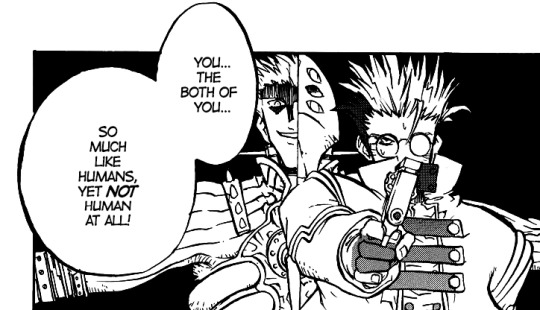
!!! I think this is the first time we've actually seen Knives' face since the Fifth Moon Incident! ...there's something to examine in this.
Feral Wolfwood <3

Yikes. If we wanted more emphasis on the way a lot of people around Vash do not stop to consider the severity of death. The violence is so typical in this world it's treated as a scene from which one can be detached. Vash's honest distress and compassion as entertainment :(
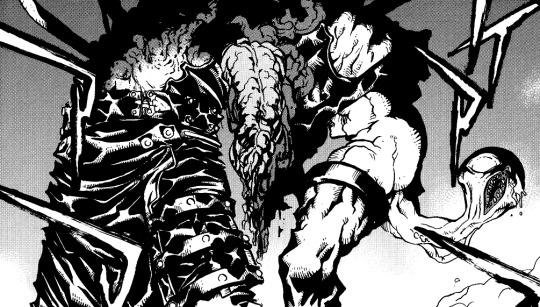
Hey. What the fuck.
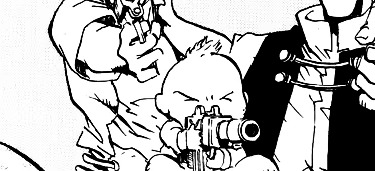
The baby with the gun would be a lot funnier if I didn't know what Leonof had to do to people to make his puppets.
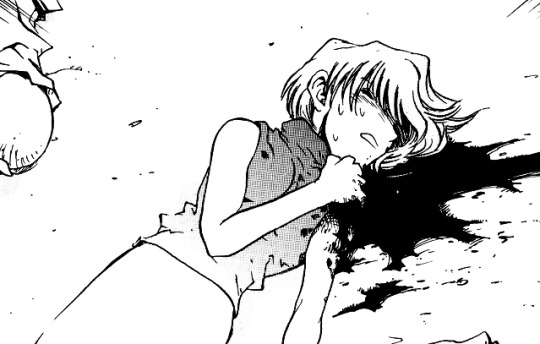
SICK AND TWISTED. WTF.
Ok say what you will though but Leonof so far has been the only one of the GHG that I think actually understands the assignment. Like. Yeah, this sure is the way to fucking break the guy. What the hell.
Oh, Vash knows him? Maybe that's why Leonof knows how to hurt him so well...?
AUGH he had puppet Doc, who vouched for Vash earlier to Brad, call him a demon!!! This also means he was killed! WTF
AUGHHHH wolfwood :(((
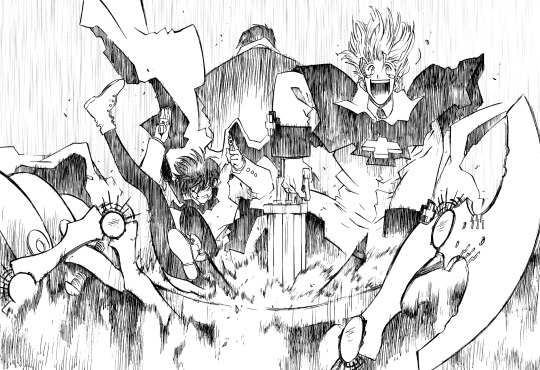
Meryl and Milly I love you so so much
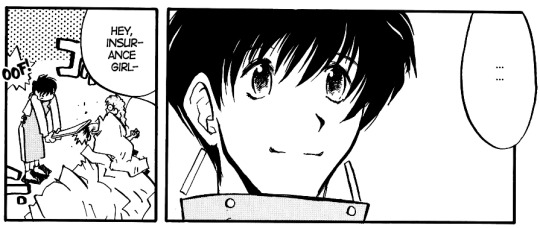
Whjfhbdsjfbhv??? Girl??????
Vash: *starts blaming himself* Luida: "no." Vash: "oh, ok." :(
Hair down Vash <3
I really love the way we find out a bit more about Vash in this chapter. Him taking Meryl and Milly to a special place that helps him relax and heal and feel closer to Rem, even if he doesn't quite tell them that's what it is. Meryl knowing it's important somehow anyways and feeling like she can see him a little more clearly. Wolfwood freaked the hell out by the idea that Vash is immortal, but instead of leaving it at his assumptions, he still goes to talk to Luida and ask questions, who immediately proceeds to emphasize how lonely yet kind he is. We learn a lot about Vash in this chapter without him actually revealing anything about himself directly - all through other people, and the impact he's made on them. And I like how even though we find out more and more the differences between human and whatever Vash actually is, we circle right back around to confirming what we already knew about him from the beginning - he's fundamentally a kind man with a lot of pain in his heart who always makes the active choice to be nice. Just. Agh.
Wolfwood, running while carting his stupid IV pole over his shoulder: "oh fuck I need to protect women (and Vash)"

Softest look I've ever seen. What.
But ohhh does this make me happy. Because he's spent this volume thinking Vash has no survival instinct because he's immortal, etc., which terrifies him because he cannot understand not fighting to survive. Vash's smile makes a comeback here, but he now understands that it's not just a mask, it is the way he fights to survive. That smile is Vash's struggle to live in the same way the violent struggle is his, and Wolfwood I think/hope is starting to realize again that the gap is not so wide between them. He's calmed enough to remember that he actually likes this guy. Augh.
24 notes
·
View notes